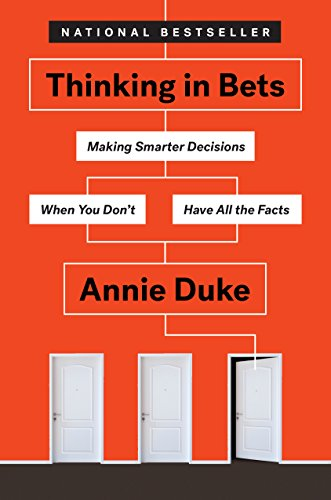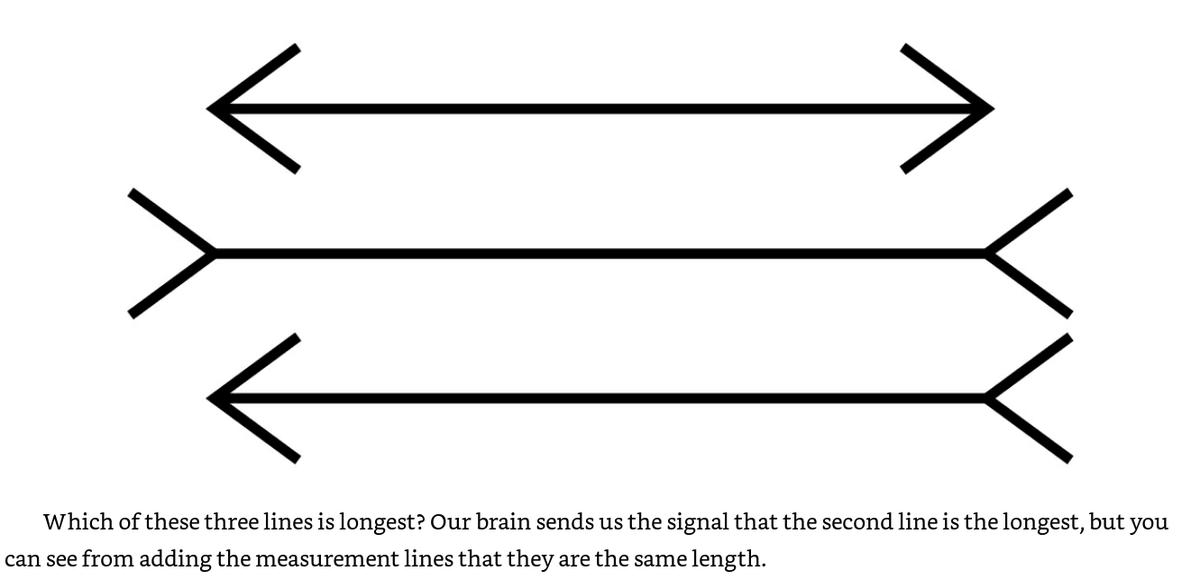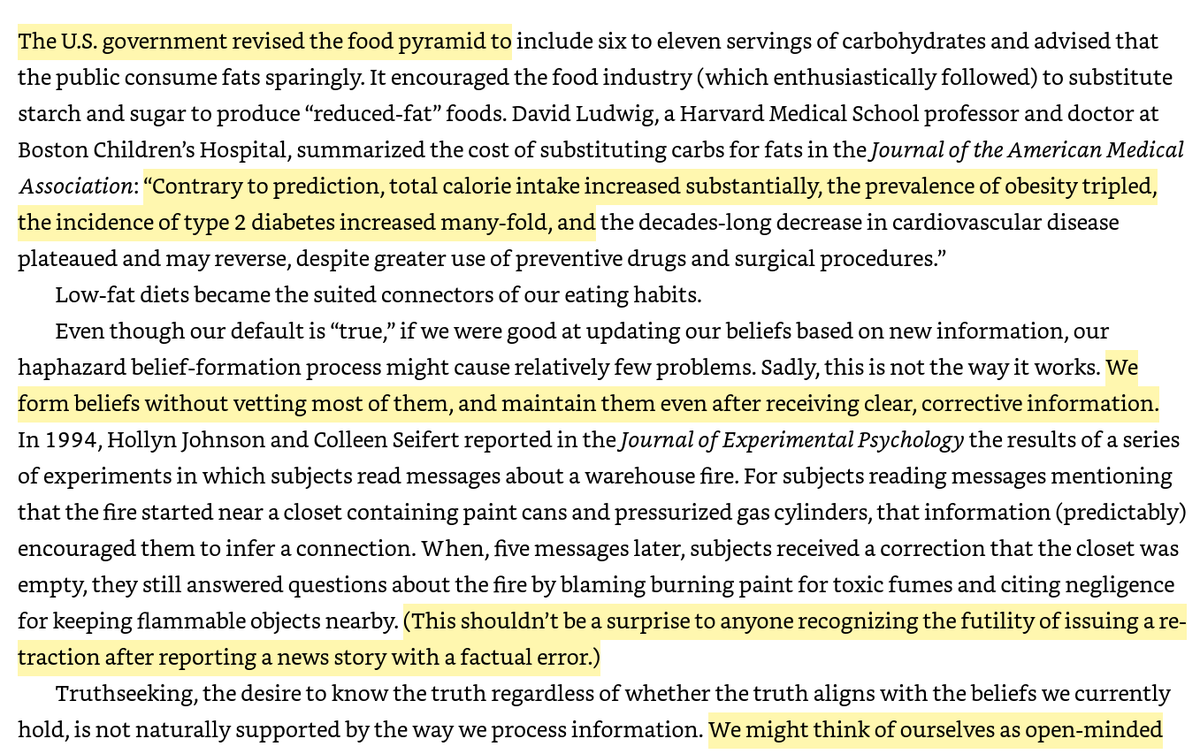1/ Thinking in Bets: Making Smarter Decisions When You Don't Have All the Facts (Annie Duke)
Thread
"World-class poker players taught me to understand what a bet really is: a decision about an uncertain future."
https://www.amazon.com/Thinking-Bets-Making-Smarter-Decisions-ebook/dp/B074DG9LQF/
Thread
"World-class poker players taught me to understand what a bet really is: a decision about an uncertain future."
https://www.amazon.com/Thinking-Bets-Making-Smarter-Decisions-ebook/dp/B074DG9LQF/
2/ "We can get better at separating outcome quality from decision quality, say “I’m not sure,” learn strategies to map out the future, become less reactive, build and sustain pods of fellow truthseekers, and recruit our past and future selves to make fewer emotional decisions."
3/ "Mistakes, emotions, losing—those things are all inevitable because we are human. The approach of thinking in bets moved me toward objectivity, accuracy, and open-mindedness. That movement compounds over time to create significant changes in our lives."
4/ "Most people didn’t want to give Carroll credit for having any reason at all for his call. Why did so many people so strongly believe he got it wrong?
"In four words: the play didn't work.
"He had control over the quality of the decision but not over how it turned out."
"In four words: the play didn't work.
"He had control over the quality of the decision but not over how it turned out."
5/ "Hindsight bias is the tendency, after an outcome is known, to see the outcome as having been inevitable. When we say, “I should have known,” or, “I should have seen it coming,” we are succumbing to hindsight bias: an overly tight connection between outcomes and decisions."
6/ "We link results with decisions even though it is easy to point out indisputable examples where the relationship isn’t so perfectly correlated. No sober person thinks getting home safely after driving drunk reflects a good decision or good driving ability."
7/ "Working backward from results is susceptible to cognitive traps, like confusing causation with correlation or cherry-picking data to confirm a narrative. We pound square pegs into round holes to maintain the illusion of a tight relationship between outcomes and decisions."
8/ "Making more rational decisions isn’t just a matter of willpower or consciously handling more decisions. Our deliberative capacity is already maxed out. We don’t have the option, once we recognize the problem, of merely shifting the work to a different part of the brain."
9/ "We need shortcuts, but they come at a cost. Many decision-making missteps originate from the pressure on the reflexive system to do its job fast and automatically.
"We’ve tuned out, cut short, and are predisposed to dismiss anything that varies from what we already 'know.' "
"We’ve tuned out, cut short, and are predisposed to dismiss anything that varies from what we already 'know.' "
10/ "We have defaults we rarely examine, from gripping a pencil to swerving to avoid an auto accident.
"Being aware of irrational behavior and wanting to change is not enough, just as knowing that you are looking at a visual illusion is not enough to make the illusion go away."
"Being aware of irrational behavior and wanting to change is not enough, just as knowing that you are looking at a visual illusion is not enough to make the illusion go away."
11/ "We can look for practical work-arounds like carrying around a ruler.
"Solving the problem of how to execute (avoiding common decision traps, learning from results in a rational way, keeping emotions out of the process) is even more important than innate talent in poker."
"Solving the problem of how to execute (avoiding common decision traps, learning from results in a rational way, keeping emotions out of the process) is even more important than innate talent in poker."
12/ "Our lives—business, saving/spending, health and lifestyle choices, raising children, relationships—involve uncertainty, risk, and occasional deception. Trouble follows when we treat life decisions as if they were chess decisions (no hidden information and very little luck)."
13/ "When we think probabilistically, we are less likely to use adverse results alone as proof that we made a decision error, because we recognize the possibility that the decision might have been good but luck and/or incomplete information (and a sample size of one) intervened."
14/ "When we move away from a world where there are only two opposing, discrete boxes that decisions can be put in, we start living in the continuum between the extremes. Making better decisions stops being about wrong or right but about calibrating among all the shades of grey."
15/ "Job and relocation decisions, sales negotiations and contracts, buying a house are bets. Ordering the chicken instead of the steak is a bet. Everything is a bet.
"We are betting that the future version of us that results from the decisions we make will be better off."
"We are betting that the future version of us that results from the decisions we make will be better off."
16/ "If we can find ways to become more comfortable with uncertainty, we can see the world more accurately and be better for it.
"We form beliefs in a haphazard way, believing all sorts of things based just on what we hear out in the world but haven’t researched for ourselves."
"We form beliefs in a haphazard way, believing all sorts of things based just on what we hear out in the world but haven’t researched for ourselves."
17/ ...
1. We hear something
2. We believe it to be true
3. Only sometimes, later, if we have the time or the inclination, we think about it and vet it, determining whether it is, in fact, true or false.
...
1. We hear something
2. We believe it to be true
3. Only sometimes, later, if we have the time or the inclination, we think about it and vet it, determining whether it is, in fact, true or false.
...
18/ ”People find it very easy to believe and very difficult to doubt. Believing is so easy, and perhaps so inevitable, that it may be more like involuntary comprehension than rational assessment.”
"A quick Google search will show many of our commonly held beliefs to be untrue."
"A quick Google search will show many of our commonly held beliefs to be untrue."
19/ "For example, we use all parts of our brain. The 10% figure was made up to sell self-improvement books; neural imaging and brain-injury studies disprove the fabrication."
20/ On the food pyramid:
"The same belief-formation process led hundreds of millions of people (led by advice drawn, in part, from research secretly funded by the sugar industry) to bet the quality and length of their lives on their belief about the merits of a low-fat diet."
"The same belief-formation process led hundreds of millions of people (led by advice drawn, in part, from research secretly funded by the sugar industry) to bet the quality and length of their lives on their belief about the merits of a low-fat diet."
21/ "We might think of ourselves as open-minded, but the research conclusively shows otherwise. Instead of altering our beliefs to fit new information, we do the opposite, altering our interpretation of that information to fit our beliefs."
22/ "Once a belief is lodged, it becomes difficult to dislodge. It leads us to notice and seek out evidence confirming our belief, rarely challenge the validity of confirming evidence, and ignore or work hard to actively discredit information contradicting the belief."
23/ "The Internet is a playground for motivated reasoning. It provides the promise of access to a greater diversity of information sources and opinions than we’ve ever had available, yet we gravitate toward sources that confirm our beliefs, that agree with us."
24/ "Even when directly confronted with facts that disconfirm our beliefs, being wrong doesn’t fit into [our self-perception]. It feels bad, so we ignore or discredit new information.
"The smarter you are, the better at rationalizing and framing data to fit your point of view."
"The smarter you are, the better at rationalizing and framing data to fit your point of view."
25/ "Subjects identifying as liberal interpreted data to support their belief (gun control reduces crime). Conservatives interpreted the same data to support the opposing belief.
"More numerate people made more mistakes interpreting data on the emotionally charged topic."
"More numerate people made more mistakes interpreting data on the emotionally charged topic."
26/ "Being asked if we are willing to bet money makes it much more likely that we will examine our information in a less biased way, be more honest with ourselves about how sure we are of our beliefs, and be more open to updating and calibrating our beliefs."
27/ "If you went around challenging everyone with “Wanna bet?” it might be difficult to make friends. But we can change how we think about decisions.
"Practically every fact we’ve ever known has been subject to revision or reversal. (Samuel Arbesman’s The Half-Life of Facts)"
"Practically every fact we’ve ever known has been subject to revision or reversal. (Samuel Arbesman’s The Half-Life of Facts)"
28/ "More than a third of 'extinct' species have subsequently been rediscovered. Given that even scientific facts can have an expiration date, we would all be well-advised to look hard at our beliefs, which are formed and updated in a much more haphazard way than in science."
29/ "Our narrative of being a knowledgeable, educated person who holds quality opinions isn’t compromised when we use new information to calibrate beliefs vs. having to make a full-on reversal. This shifts us away from treating information that disagrees with us as a threat."
30/ "By saying, “I’m 80%” and thereby communicating we aren’t sure, we open the door for others to tell us what they know. They realize they can contribute without having to confront us by saying or implying, “You’re wrong.”
31/ "When scientists publish results of experiments, they share their methods of gathering and analyzing data, the data itself, and confidence levels.
"By institutionalizing the expression of uncertainty, scientists invite their community to test and challenge the results."
"By institutionalizing the expression of uncertainty, scientists invite their community to test and challenge the results."
32/ "Was Jane a better salesperson than Joe? Or was it because the company updated its product line? Did a low-cost competitor go out of business? Or is the difference due to any of a variety of other unconsidered reasons? It’s hard to know run a controlled experiment."
33/ "We take credit for the good stuff and blame the bad stuff on luck so it won’t be our fault. The result is that we don’t learn from experience well.
"When we figure out why something happened, we look for a plausible reason, but one that also fits our wishes."
"When we figure out why something happened, we look for a plausible reason, but one that also fits our wishes."
34/ "In multiple-vehicle accidents, 91% of drivers blamed someone else. Most remarkably, MacCoun found that in single-vehicle accidents, 37% of drivers still found a way to pin the blame on someone else."
35/ "If our only options are being 100% right or 100% wrong, then information that potentially contradicts a belief requires a total downgrade from 'right' to 'wrong.' There is no “somewhat less sure” option, so we ignore or discredit information to hold steadfast in our belief."
36/ "On a fundamental level, fielding someone’s bad outcome as their fault feels good to us. On a fundamental level, fielding someone’s good outcome as luck helps our narrative along.
"The way we field other people’s outcomes is part of our self-serving bias." (p. 102)
"The way we field other people’s outcomes is part of our self-serving bias." (p. 102)
37/ "If I field my win (loss) as having to do with my skillful play (luck), then my opponent in the hand must have lost (won) because of their less skillful play (luck).
"Any other interpretation would create cognitive dissonance." (p. 102)
"Any other interpretation would create cognitive dissonance." (p. 102)
38/ "By several estimates, all of these variables (objective circumstances, demographic variables, life events) put together account for no more than 8%-15% of the variance in happiness. What accounts for most of the variance is how we’re doing compared to other people." (p. 103)

 Read on Twitter
Read on Twitter




